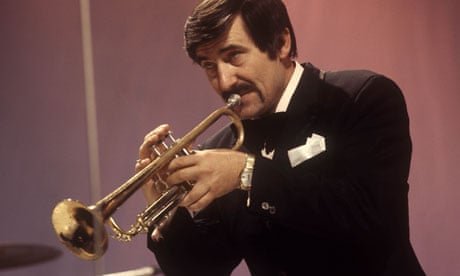In the late 1950s and early 60s, the bandleaders Kenny Ball, Chris Barber and Acker Bilk – the three Bs of British traditional jazz – reigned supreme, producing hit singles and attracting enormous audience enthusiasm. Of the trio, it was the trumpeter Ball who gained the most chart entries with his Jazzmen. He has died at the age of 82 after suffering from pneumonia: his core audience stayed loyal to the end. "My mission in life is to set people's feet tapping," Ball said. And he did.
After Ball formed his first band in 1954, he was approached by the clarinettist Sid Phillips, whose cleancut Dixieland jazz was popular, to join his band at the "handsome salary" of £30 a week. Phillips kept his trumpeter busy, with radio broadcasts and road tours, plus one-off occasions such as the Christmas staff party at Windsor Castle. Ball also had short stints with the drummer Eric Delaney's big band and Terry Lightfoot's trad group. By 1958, he was ready to form Kenny Ball and His Jazzmen; one of the original members, the trombonist John Bennett, stayed with Ball for the rest of his career.
Ball's robust, big-toned trumpet style and his zest for playing helped to build the band's appeal, and they were soon successful. Their regular spot on the BBC radio programme Easy Beat was one factor; another was their involvement with television shows such as New Faces and Top of the Pops. Album deals with Pye Records followed, as did the hit singles released in 1961, Samantha and Midnight in Moscow, which stayed in the top 10 for 21 weeks. Midnight in Moscow sold a million copies, going to No 1 in Australia, Canada, Sweden and Japan, and was covered by a host of US jazz bands, including those led by Eddie Condon and the trumpeter Teddy Buckner. It also helped to prolong the so-called "trad boom", of which Ball and the other Bs were the principal beneficiaries. Another hit came with When I'm Sixty-Four (1967).
Tour destinations included Japan and the Soviet Union, and there were seasons at the London Palladium. TV bookings included five series with Morecambe and Wise (1968-72) and a residency on Saturday Night at the Mill (1975-81).
The Jazzmen broke into the tough US market on the back of Midnight's success, appearing in New Orleans as part of a British Week. In 1968 they supported Louis Armstrong on his last European tour. They also prospered in Australia, and the relentless tours, Royal Command Variety appearances, albums and film jobs endured till well after the trad boom had waned and gone. Along the way, Ball acquired a comfortable lifestyle, with "a mansion in Essex and a Rolls-Royce in the drive".
Born in Dagenham, in the East End of London, Kenny was the youngest of nine children. His father, who had been decorated in the first world war, kept the family going throughout the Depression on his wages as a bookbinder. Ball recalled his mother as being a feisty character, and the family had Sunday afternoon singsongs where his own party piece came on the harmonica – Larry Adler was an early hero – the rest of the family joining in on an array of instruments. After a short period in Worcester, the family returned to London, "just in time for the blitz", living close to the railway in Goodmayes.
A keen member of the local sea cadets, Ball became a bugler, setting in train his eventual love affair with the trumpet. He acquired his first proper instrument for £10 at the age of 13, via an advertisement in the Melody Maker.
Inspired by Harry James, he started to play jazz with friends; a year later, he left school to work as a messenger for the J Walter Thompson agency, the first of a succession of jobs taken while he honed his jazz skills at night. Engaged at 17 to Betty – they married six years later – Ball spent his national service as a craftsman in the Royal Electrical and Mechanical Engineers, and played in a trio in the Naafi. After the army, he balanced a variety of day jobs with gigs in Soho, often working with the trombonist Charlie Galbraith.
Once he had launched the Jazzmen, critics were often condescending about the band's showbiz style, but no one who listened carefully to Ball himself could doubt his jazz credentials. His range, bright tone and vigorous attack marked him out as a powerhouse player. He was always exuberant and cheerful and a natural crowd-pleaser – cockney quiff, white tuxedo and all. His autobiography, Blowing My Own Trumpet, appeared in 2004.
Until 2002, the Jazzmen did 150 dates a year. They remained active: Ball's last appearance with them was in Germany in January, and in recent years they sometimes appeared in programmes with Barber and Bilk's bands.
Ball's first marriage ended in divorce in 1982. He is survived by his second wife, Michelle; his stepdaughters Nicole and Sophie; and his children from his first marriage, Gillian, Jane and Keith, now a vocalist with the band.

Comments (…)
Sign in or create your Guardian account to join the discussion